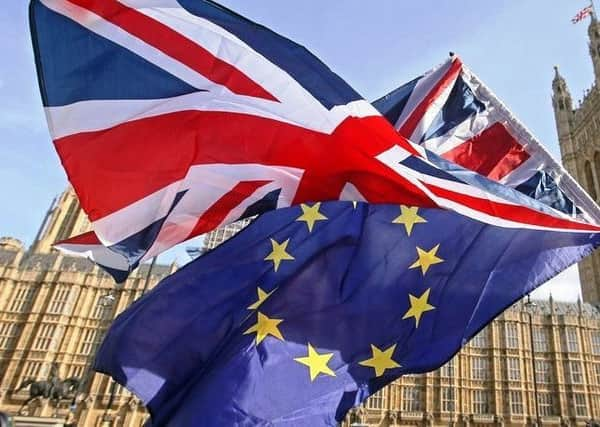Unionists have to grapple with the middle-class tantrum over Brexit


Yet, for all the excited chatter, the crux of the discussion isn’t new.
For the whole of Northern Ireland’s history, nationalists and republicans have believed that it would be replaced soon by a 32-county republic, independent of Britain.
Advertisement
Hide AdAdvertisement
Hide AdThe intensity of this sense of destiny rises and falls, but it’s an ever present force in politics on both sides of the border.
Leaving the EU brings a new dynamic to the debate, but it has little to do with traditional nationalism. The collective, middle-class strop that self-styled liberals have thrown over Brexit is far more dangerous.
The existence of this phenomenon was difficult to test previously, other than by anecdote and through social media, but its existence was suggested recently by Lord Ashcroft’s poll on attitudes to the Union.
When unionists and nationalists were asked how they would vote on ‘Irish unification’, if a referendum were held tomorrow, they answered predictably enough.
Advertisement
Hide AdAdvertisement
Hide AdIn contrast, more Alliance voters said they would opt to leave the UK and join the Republic of Ireland than expressed a preference for remaining in the UK.
This defies logic.
Brexit has undeniably created uncertainty in Northern Ireland, and complicated disputes about sovereignty and identity. People are anxious about how it will be implemented and how it will affect their lives.
Yet, if voters are worried that leaving the EU might cause disruption, social and economic turmoil is practically guaranteed if Northern Ireland is wrenched from the UK, to create a brand-new, all-island state.
Our economy and our prosperity are dependent overwhelmingly on our links with the rest of the UK.
Advertisement
Hide AdAdvertisement
Hide AdWe do four times as much business with mainland Britain as we do with the Republic. As one of the poorer regions of the UK, we receive about £12 billion more a year from Westminster than we pay into the Exchequer in taxes.
The best idea that nationalists have come up with to replace this money, short of causing devastating hardship, involves London continuing to cough up, for decades after we’re absorbed by the Republic.
When the journalist Paul Gosling wrote a report articulating the economic case for Irish ‘unity’, he proposed massively reducing public sector employment in NI.
Our economy is certainly unhealthily dependent on government money, but the University of Ulster economist, Dr Esmond Birnie, pointed out that Gosling’s plan would mean quickly laying off 50,000 people.
Advertisement
Hide AdAdvertisement
Hide AdRather than gradually rebalancing the economy from the public to the private sector, it would “be a shattering blow” to both.
There is no rational case for an independent, all-Ireland state at the current time, so there must be emotional reasons that self-styled ‘moderate’ voters are receptive to the idea.
Alliance voters are concentrated overwhelmingly in the east of NI, as are the few ‘soft unionists’.
If you looked at these people broadly, as a type, you’d find a preponderance of well-off professionals, who have benefited enormously from our constitutional set-up and are likely to be thoroughly integrated with the rest of British society.
Advertisement
Hide AdAdvertisement
Hide AdThey travel back and forward to Great Britain for work and conferences, they’re often paid by UK companies and they frequently attended universities on the mainland.
Some of the most vocal are quite clear that they hate Brexit and, one suspects, they would like to dissociate themselves from the hordes they believe voted to leave the EU. Among privileged liberals, that’s been a familiar refrain right across the UK.
It’s not uncommon to hear remainers say that they “want their country back”. In Northern Ireland, some are so spitting mad, that they’d even consider joining a completely new nation state.
While it’s an attitude that is professed noisily in public, it’s difficult to tell how deeply ingrained this mentality is in reality.
Advertisement
Hide AdAdvertisement
Hide AdSurely, if the secretary of state were actually to call a border poll and people started to focus on the issues properly, self-interest and common-sense would trump a tantrum about leaving the EU, distaste for the DUP and unease at the way social issues are handled?
Is there really a significant section of our society that is prepared to take its chances in a turbulent, 32-county state, because its members don’t like Brexit, get on well with their chums from Dublin 4 at the rugby and have, almost overnight, adopted the (admittedly persuasive) case for same sex marriage, with special fervour?
It’s tempting to hold such complacency about Northern Ireland’s constitutional position in contempt. I know I do (can you tell?); but I have the luxury of writing columns about these issues, and it’s not my responsibility to protect the Union.
Unfortunately for unionist politicians, they have no choice but to grapple with these changes, because maintaining the integrity of the UK is far more important than preventing people from getting married.
Ultimately, it’s also more important than taking a purist attitude to Brexit.